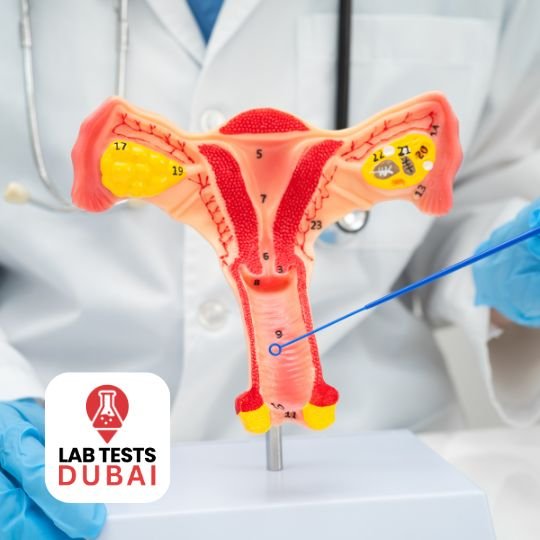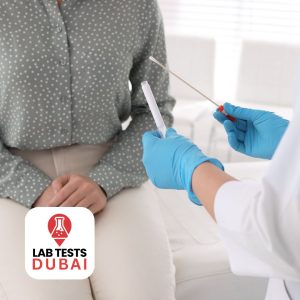Comprehensive HPV PCR Test – Detects 40 Genotypes for Accurate Screening
950,00 د.إ
The HPV PCR (40 genotypes) test is a comprehensive molecular diagnostic tool that detects and identifies 40 different genotypes of the Human Papillomavirus (HPV), including both high-risk and low-risk strains. Utilizing advanced PCR technology, it offers high sensitivity and specificity for early and accurate detection.
Sample Type : Swab/LBC/Urine
Methodology : PCR
TAT : 3 days
Description
HPV PCR (40 Genotypes) Lab Test – Comprehensive Screening for High-Risk & Low-Risk HPV Strains
The HPV PCR (40 Genotypes) Test from Lab Tests Dubai is a cutting-edge molecular diagnostic testthat detects and identifies 40 different strains of human papillomavirus (HPV) including 14 high-risk types linked to cervical, anal, and oropharyngeal cancers, and 6 low-risk types that cause genital warts.

Using advanced PCR (Polymerase Chain Reaction) technology, this test goes beyond basic HPV screening by:
- Identifying the exact HPV genotype present
- Distinguishing between high-risk (oncogenic) and low-risk (benign) strains
- Detecting HPV even in vaccinated individuals (as vaccines don’t cover all types)
- Supporting Pap smear follow-up and colposcopy decisions
This test is essential for:
- Women with abnormal Pap smears (ASC-US, LSIL, HSIL)
- Those undergoing cervical cancer screening (especially ages 30+)
- Individuals with genital warts or recurrent infections
- Monitoring HPV persistence or clearance
- Assessing risk in immunocompromised patients
With results in just 3 days, Lab Tests Dubai helps gynecologists and women’s health specialists stratify risk, avoid unnecessary procedures, and take preventive action so you can protect your reproductive health with confidence.
Available with private female-led sample collection, Lab Tests Dubai ensures accurate, discreet, and stress-free testing so you can stay ahead of HPV.
Why You Need This Test
If you’ve had an abnormal Pap smear, genital warts, or are sexually active, this test could reveal a high-risk HPV strain—so you can prevent cervical cancer before it starts.
You need the HPV PCR (40 Genotypes) Test if:
- You received an abnormal Pap smear result (ASC-US, LSIL, etc.)
- You have visible genital warts or recurrent lesions
- You’re 30+ and due for HPV co-testing
- You’re vaccinated but sexually active (vaccine doesn’t cover all types)
- You have a weakened immune system (HIV, transplant, long-term steroids)
- You have multiple sexual partners or a partner with HPV
- You want proactive cervical cancer screening
This test helps:
- Identify cancer-causing HPV types (e.g., HPV 16, 18, 31, 33, 45)
- Rule out high-risk infection and avoid colposcopy if low-risk
- Monitor HPV clearance after treatment
- Guide vaccination decisions (for partners)
- Empower informed decisions about follow-up care
Early testing cancer prevention, not just detection.
Symptoms That Indicate This Test
Consider the HPV PCR Test if you experience:
✅ For High-Risk HPV (Often Asymptomatic):
- Abnormal Pap smear or cervical dysplasia
- No symptoms (most high-risk HPV is silent)
- History of cervical treatment (LEEP, cone biopsy)
✅ For Low-Risk HPV:
- Genital warts (cauliflower-like growths)
- Itching, discomfort, or bleeding in genital area
- Recurrent warts despite treatment
✅ For High-Risk Individuals:
- Women aged 30–65 (recommended for HPV co-testing)
- Immunocompromised patients
- Smokers (increased cancer risk)
- Those with multiple sexual partners
These signs may point to HPV infection and this test helps start the right care.
How HPV Causes Cancer & Warts
HPV spreads through skin-to-skin genital contact even without intercourse.
There are over 100 HPV types, but only some cause disease:
- High-Risk (Oncogenic): HPV 16, 18, 31, 33, 45, 52, 58 → Cervical, anal, throat cancer
- Low-Risk: HPV 6, 11 → Genital warts
After infection:
- The virus enters epithelial cells of the cervix or genital skin
- In most people, the immune system clears it in 1–2 years
- In some, persistent infection leads to cellular changes (dysplasia) → cancer over 10–20 years
The HPV PCR Test:
- Detects viral DNA from 40 genotypes
- Identifies high-risk types early
- Helps determine monitoring frequency or need for colposcopy
This is the most accurate way to assess your cancer risk.
What Happens If Untreated? Risks of Ignoring HPV
Ignoring high-risk HPV can lead to:
⚠️ Cervical Dysplasia (CIN 1/2/3) – precancerous changes
⚠️ Cervical Cancer – preventable but deadly if late-stage
⚠️ Anal, Vaginal, or Oropharyngeal Cancer – in persistent cases
⚠️ Recurrent Genital Warts – physical and emotional distress
⚠️ Transmission to Partners – even without symptoms
The good news? HPV-related cancers are preventable with:
- Regular screening (Pap + HPV testing)
- Colposcopy and treatment of precancerous cells
- HPV vaccination (Gardasil 9 covers 9 types)
- Smoking cessation (reduces cancer risk)
Early testing prevention of life-threatening disease.
How to Prepare for the Test
To ensure accurate results:
✅ Avoid sexual activity 24–48 hours before
✅ Do not use vaginal creams, douches, or tampons 48 hours before
✅ Schedule the test when not menstruating (blood can interfere)
✅ Inform your doctor of:
- Recent Pap smear results
- HPV vaccination history
- Current symptoms or treatments
A cervical swab (LBC) or urine sample is collected by a female healthcare provider quick and minimally uncomfortable.
Test Overview: PCR Methodology
Report Includes:
- Negative → No HPV detected
- Positive → Specific genotype(s) identified (e.g., HPV 16, HPV 6)
- Risk Classification (High-Risk, Low-Risk, or Both)
- Clinical Recommendations for follow-up
Note: More accurate than p16/Ki-67 or basic HPV tests.
Benefits of the HPV PCR (40 Genotypes) Test
🔹 Identifies Exact HPV Strain
Know your cancer or wart risk.
🔹 Guides Colposcopy Decisions
Avoid unnecessary procedures.
🔹 Monitors Clearance or Persistence
Track your body’s response.
🔹 Supports Vaccinated Individuals
Check for non-vaccine types.
🔹 Peace of Mind
Take control of your cervical health.
If you’re due for screening, had an abnormal Pap, or have genital warts, the HPV PCR (40 Genotypes) Test gives you the answers you need in just 3 days.







Reviews
There are no reviews yet.